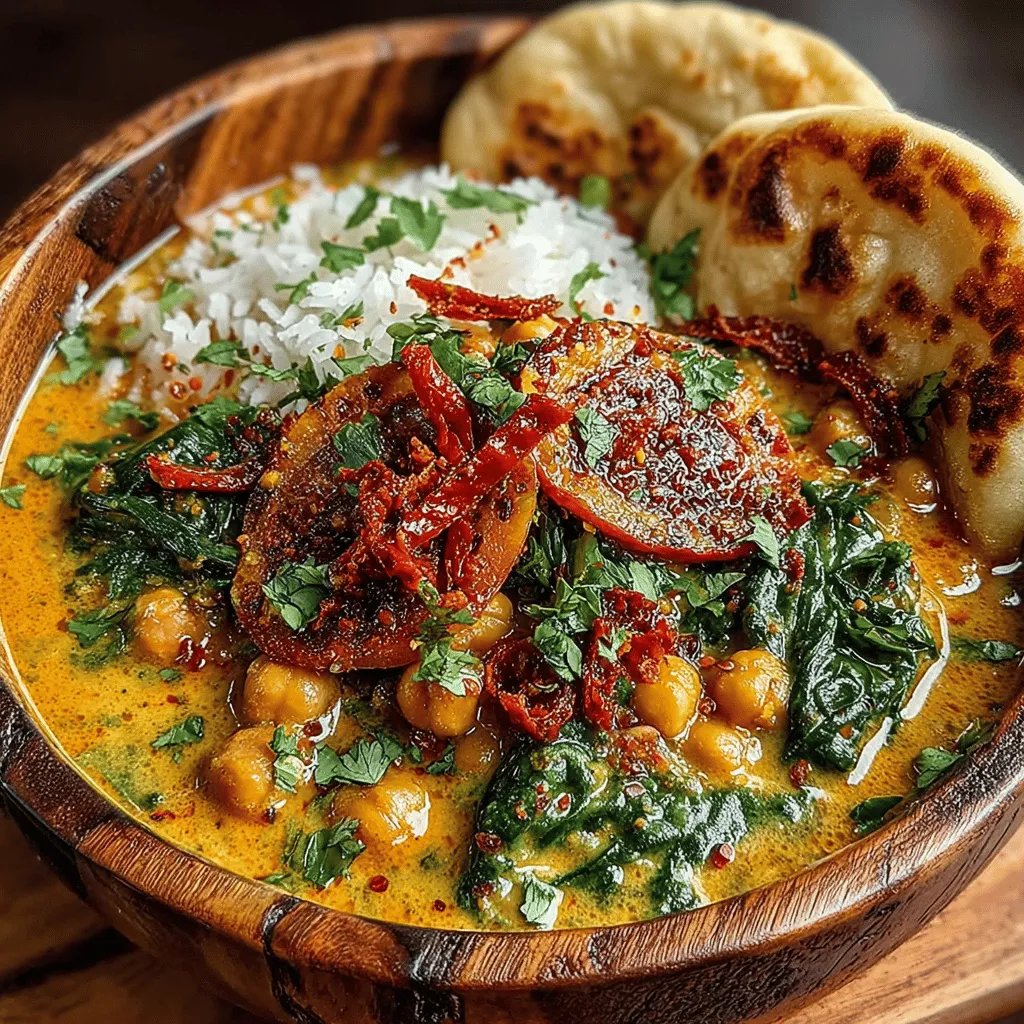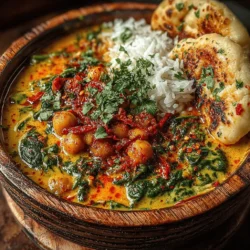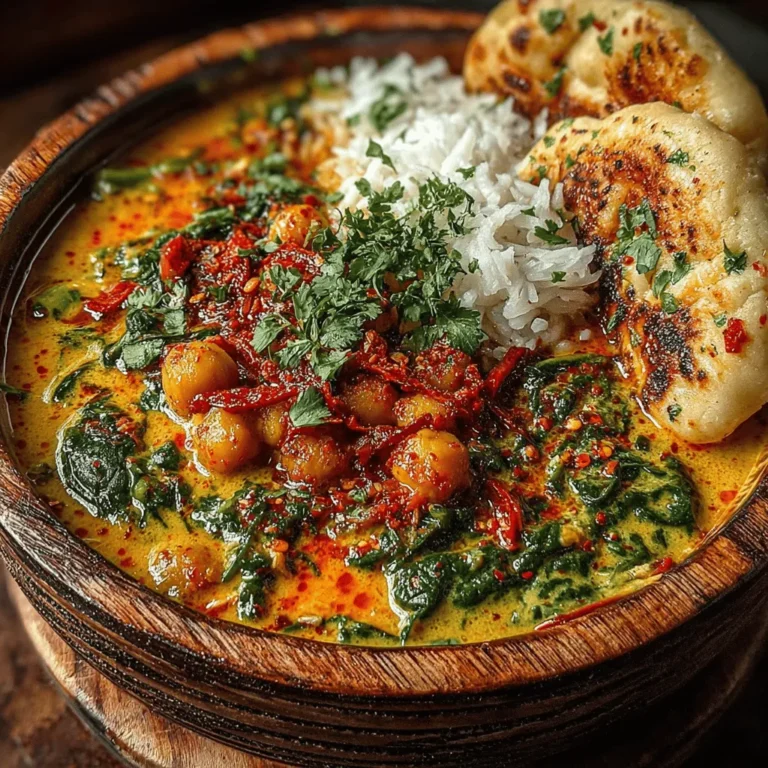Introduction
Spicy Chickpea and Spinach Coconut Curry is not just a meal; it’s a delightful fusion of flavors that perfectly balances heat and creaminess. This vegetarian dish is rich in protein, thanks to chickpeas, while spinach adds a nutritious green touch. With the exotic aroma of spices and the creamy texture from coconut milk, this curry is sure to become a favorite in your household. In this article, we will explore the ingredients, cooking techniques, and the cultural significance of this dish, ensuring you not only know how to make it but also appreciate its roots.
Ingredients
– 1 can (15 oz) chickpeas, drained and rinsed
– 2 cups fresh spinach, washed and chopped
– 1 can (14 oz) coconut milk
– 1 medium onion, finely chopped
– 3 cloves garlic, minced
– 1-inch piece of fresh ginger, grated
– 2 tablespoons curry powder
– 1 teaspoon ground cumin
– 1 teaspoon ground coriander
– 1/2 teaspoon ground turmeric
– 1/2 teaspoon chili flakes (adjust to taste)
– 2 tablespoons vegetable oil
– Salt and pepper to taste
– Fresh cilantro for garnish (optional)
Instructions
1. Heat the vegetable oil in a large skillet over medium heat.
2. Add the chopped onion and sauté for about 5 minutes until it becomes translucent.
3. Stir in the minced garlic and grated ginger, cooking for another 1-2 minutes until fragrant.
4. Sprinkle in the curry powder, cumin, coriander, turmeric, and chili flakes. Toast the spices for 1-2 minutes, stirring constantly to release their flavors.
5. Add the drained chickpeas to the skillet, mixing well to coat them in the spice mixture.
6. Pour in the coconut milk and stir until everything is well combined.
7. Bring the mixture to a gentle simmer, then reduce the heat and let it cook for about 10 minutes, allowing the flavors to meld.
8. Stir in the chopped spinach and cook for an additional 3-5 minutes until the spinach is wilted.
9. Season with salt and pepper to taste before serving.
10. Garnish with fresh cilantro if desired.
Understanding the Ingredients
Exploring the Core Components of the Dish
– Chickpeas: Nutritional benefits and versatility
Chickpeas are a fantastic source of protein and fiber, making them a staple in vegetarian diets. Their nutty flavor and firm texture add substance to this curry, making it both filling and satisfying.
– Spinach: Health benefits and flavor profile
Spinach is packed with vitamins A, C, and K, as well as iron and antioxidants. Its mild flavor complements the spices in the curry, providing a fresh and vibrant contrast.
– Coconut Milk: The role of coconut milk in enhancing creaminess
Coconut milk is essential for giving this curry its creamy texture and rich flavor. It not only adds a hint of sweetness but also helps to balance the heat from the spices.
– Aromatics: Importance of onion, garlic, and ginger
The combination of onion, garlic, and ginger forms the aromatic base of this dish. Each ingredient contributes unique flavors that enhance the overall taste profile of the curry.
– Spices: A deep dive into curry powder, cumin, coriander, turmeric, and chili flakes
The spices used in this recipe are the heart of the dish. Curry powder provides a complex flavor, while cumin and coriander add warmth. Turmeric contributes both color and health benefits, and chili flakes allow for customizable heat levels.
The Flavor Journey of Spices
How Spices Elevate the Dish
– Toasting spices for maximum flavor
Toasting spices in oil releases their essential oils, intensifying their flavor and aroma. This crucial step ensures that the spices infuse the curry with their full potential.
– Why spice balance is essential in curry
Achieving balance among spices is key to a successful curry. The right combination enhances the dish without overpowering the individual flavors of the ingredients.
– Regional variations of spices in curry recipes
Curry recipes vary widely across different cultures and regions, each with its unique spice combinations. This dish draws on influences from Indian cuisine, showcasing how diverse and adaptable curry can be.
Preparation Techniques
Step-by-Step Cooking Process
– Heating the oil: Importance of the right temperature
Using the correct oil temperature is critical. Too hot can burn the spices, while too cool can lead to uneven cooking.
– Sautéing aromatics: How cooking time affects flavor
The longer you sauté your aromatics, the deeper the flavor will develop. However, it’s important not to overcook them to avoid bitterness.
– The art of simmering: Developing depth in your curry
Simmering allows the flavors to meld beautifully, creating a harmonious dish. It’s important to monitor the heat to achieve the right consistency.
– Achieving the perfect consistency: Tips for coconut milk integration
When adding coconut milk, do so gradually and stir well to incorporate it fully. This prevents separation and ensures a smooth texture throughout the curry.
Crafting the Perfect Curry

Combining Ingredients for Optimal Flavor
Timing of Ingredient Addition
To achieve the best flavor in your Spicy Chickpea and Spinach Coconut Curry, the timing of ingredient addition is crucial. Start by sautéing your onions, garlic, and ginger until fragrant and golden. This builds a strong flavor base. Once these aromatics are ready, it’s time to add your spices for a quick toast, which will enhance their aromas. After adding the coconut milk, allow it to simmer before introducing the chickpeas. This ensures they absorb the rich flavors of the sauce without becoming overly soft. Finally, add the spinach just a few minutes before serving. This keeps it vibrant and fresh, retaining its nutrients and color.
Seasoning Adjustments
Taste testing is essential in crafting a personalized flavor profile. After simmering your curry for a while, take a moment to taste it. You may find that it needs a touch more salt, a squeeze of lime for acidity, or an extra pinch of chili powder for heat. Remember, every palate is different, so feel free to adjust according to your preferences. Don’t be afraid to experiment with additional spices like cumin or turmeric to deepen the flavor further.
Garnishing Techniques
Garnishing can elevate your dish from ordinary to extraordinary. Fresh cilantro is a classic choice, but consider other options like thinly sliced green onions or a sprinkle of red chili flakes for added color. For a touch of creaminess, a dollop of coconut yogurt on top can also enhance the dish and provide a nice contrast to the spices.
Serving Suggestions
Complementing Your Curry
To create a well-rounded meal, consider serving your Spicy Chickpea and Spinach Coconut Curry with complementary sides. Steamed basmati rice is a classic pairing, allowing the creamy curry to balance the fluffy grains. Alternatively, warm naan bread is perfect for scooping up the curry, adding a delightful texture and flavor contrast.
Pairing Options
The choice between rice and naan can depend on personal preference or the occasion. Rice is great for a comforting, hearty meal, while naan can make for a more sociable dining experience, perfect for sharing. If you want to mix it up, consider serving both, allowing guests to choose their favorite.
Creative Twist
Leftovers can be transformed into exciting new dishes. Consider using the curry as a filling for wraps or burritos, or stir it into quinoa or pasta for a unique twist. This not only prevents waste but also introduces your palate to new flavor combinations.
Nutritional Information
Understanding the Health Benefits
This dish is not only delicious but also packed with nutrients. A typical serving contains a balanced mix of calories, protein, and fiber, making it a satisfying option for any meal. Chickpeas provide plant-based protein, while spinach adds vitamins and minerals. The coconut milk, though rich, contributes healthy fats that can support heart health when consumed in moderation.
Vegetarian and Vegan Advantages
Spicy Chickpea and Spinach Coconut Curry is an excellent choice for those following vegetarian or vegan diets. It delivers a hearty meal without the need for animal products, making it accessible for a wide range of dietary preferences. The dish can easily be adapted to include additional vegetables or legumes, ensuring variety and nutritional diversity.
The Role of Spices in Health
The spices used in this curry, such as turmeric and chili powder, offer numerous health benefits. Turmeric is known for its anti-inflammatory properties, while chili powder can boost metabolism and improve digestion. Incorporating these spices into your diet can contribute to overall wellness.
Cultural Significance of Curry
A Glimpse into Culinary Traditions
Curry has a rich history in global cuisine, originating from South Asia and evolving into various forms across the world. Each culture has adapted curry to its local ingredients and tastes, creating a diverse tapestry of flavors and cooking methods.
The Evolution of Vegetarian Curries
Vegetarian curries, in particular, have gained popularity as more people embrace plant-based eating. They reflect cultural traditions while also accommodating modern dietary preferences. This dish stands as a testament to the versatility of curry, showing that it can be both traditional and innovative.
Personal Anecdotes or Stories
Many families have their own curry recipes passed down through generations, each with unique twists and cherished memories. Sharing a curry meal often brings people together, creating a sense of community and belonging. This dish can evoke similar sentiments, whether enjoyed at home or shared with friends.
Conclusion
Spicy Chickpea and Spinach Coconut Curry is more than just a meal; it embodies the essence of comfort food while being nourishing and packed with flavor. By understanding the ingredients, preparation techniques, and cultural roots, you can appreciate this dish on a deeper level. Whether you’re cooking for yourself or hosting a dinner party, this curry is sure to impress with its richness and complexity. Embrace this recipe and let it become a staple in your culinary repertoire, reflecting both tradition and innovation in every bite.


